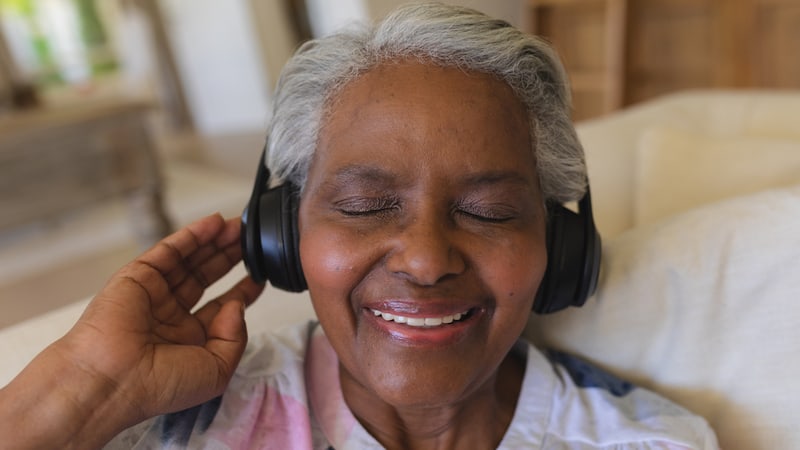Your senses provide numerous benefits. They help you stay safe, sharpen your mind, enhance your mental health, and provide rich pleasures. While the senses benefit people of all ages, giving them extra attention can be especially useful for older adults, including those facing memory issues. Smell, sight, hearing, and taste can fade with age, but by exercising your senses, you can continue to reap the benefits– no barbells or treadmills needed!
Enjoyable and stimulating ideas for exercising your senses
Sight
Vision is a powerful tool. The things you see can bring joy. They can evoke memories and help create new ones.
Engaging in visual art activities is a creative and fun way to use sight. In a group class, with a friend, or alone, choose from drawing, painting, scrapbooking, crafting, and more. For a quick and easy art activity, even on the go, grab an adult coloring book and a package of coloring pencils. Coloring is a relaxing, stress-relieving activity.
Take a walk in nature – at a botanical garden, a state park, or around the neighborhood. Choose a location that has vibrant flowers, wildlife, or perhaps a water feature to look at. While there, take photos of your surroundings. Photography is a great way to create photo albums that can be used later to evoke memories and emotions.
Related: 16 brain exercises for seniors
Hearing

Studies have shown that music, including listening to recorded music and playing an instrument, can boost mood and evoke memories.
Getting out in nature will expose you to many different sounds. Waves crashing and seagulls calling at the beach, squirrels skittering through trees, crickets chirping at night, water tumbling over rocks – these and so many other nature sounds can stimulate the mind and relax the soul.
If you can’t get out to a natural setting, a noise machine can simulate the experience.
Birding is a popular activity that will introduce you to a myriad of bird calls that you can learn to identify. Spotting and seeing the birds is also a great visual stimulus.
Related: Benefits of learning a musical instrument
Touch
Crafts that include touching different tactile media such as yarn (knitting and crochet) or clay (pottery) can enhance touch.
For those who enjoy gardening, getting your hands into the soil or handling plants can engage your tactile senses. As an added benefit, soil microbes can trigger a rush of serotonin, a mood-boosting chemical in the human body.
Spa treatments such as a massage or facial can be relaxing, especially for those not receiving physical touch on a regular basis.
For those with memory issues, it may be engaging to fill a sensory box with items of varying textures, such as kinetic sand, different types of fabrics, Play-Doh, modeling clay, or putty.
Taste

Although we tend to stick with favorite foods and beverages, there are so many different things to taste. Try something new! Next time you are in the produce aisle, grab a fresh mango or a dragon fruit instead of an apple or banana. Grow your own fresh veggies and herbs. There is nothing as fresh as food grown in your own garden! Even a window or container garden is a great way to grow herbs that will wake up fresh dishes or create healthy salads.
Even when chowing down on familiar foods, challenge yourself to pull out different flavors and textures within a single dish – the garlic, basil, and tomatoes in the spaghetti sauce or the different ingredients in a salad.
Smell
A smell can evoke memories or simply offer relaxing aromatherapy. While synthetic fragrance oils may irritate some people, especially those who easily get headaches, or have asthma or other respiratory issues, essential oils can provide the benefits without the side effects.
Scented candles can bring back memories, like a peppermint or pine-tree scent candle evoking memories of Christmas, sometimes even for a person struggling with a memory disorder. The smell of baking – like chocolate chip cookies, warm banana bread, or apple pie – is not only pleasurable, but it can summon warm memories.
For those who enjoy the outdoors, the smells of nature can be inspiring. Sitting on the porch and smelling the rain is very relaxing to me, as is walking past my herb garden and touching different herbs to release their fragrance.
To take your sensory activities to the next level, engage in group activities, which will help you to not only excite the senses, but build community and foster connections amongst peers. For example, a cooking class will not only engage the sense of taste, but provide the opportunity to perhaps make a new friend. A food or wine tasting may be an opportunity to discover new foods or enjoy favorites with other like-minded individuals.
Related: Why our senses matter
The five-sense grounding technique
The 5-4-3-2-1 method can help manage stress and anxiety. Identify – and let your mind focus momentarily on:
- 5 things you see
- 4 things you can touch
- 3 sounds
- 2 scents
- 1 taste
The five-sense technique diverts your focus from troublesome thoughts while using each of your senses.
Make it a goal to introduce at least one sensory activity to your daily routine. You’ll be exercising your senses and experiencing the benefits, too.

